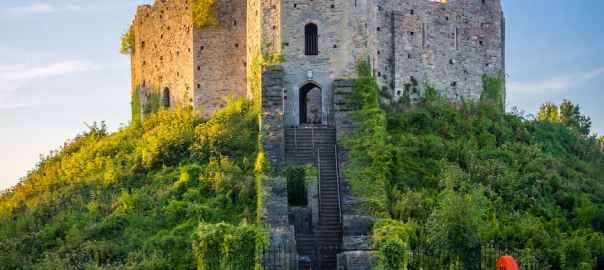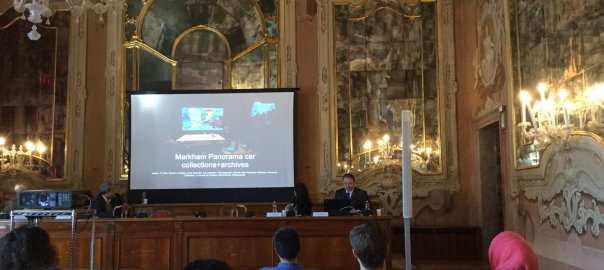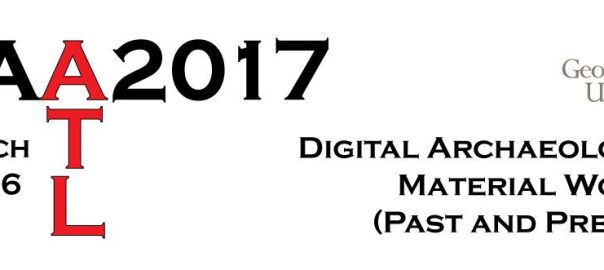Thanks to echoing.eu and NTNU for inviting me to Europe.
MONDAY 16 October NTNU talk, Gunnerus Library, TRONDHEIM NORWAY 12:00-13:00
LUNCH WITH A WRITER: “PLAYING WITH THE PAST”
The eCHOing project is inviting you to a lunch lecture, join us for an exciting event that explores the fascinating world of visitor experiences in the GLAM sector (Galleries, Libraries, Archives, and Museums). Photo: gunnerus.no NTNU UB
TUESDAY 17 OCTOBER Hands-on Game Design Workshop, TRONDHEIM NORWAY, 09:30-14:30
Join us for an exciting event that explores the fascinating world of visitor experiences in the GLAM sector (Galleries, Libraries, Archives, and Museums).
Whether you’re a student curator, librarian, archivist, or museum enthusiast, this event is a must-attend to stay ahead in the ever-evolving GLAM landscape.
In this half-day workshop Erik Champion will help small groups of 4 brainstorm (“ideate”) ideas to create engaging games using a simplified working definition of computer games, and with the help of physical items. Although these game ideas could eventually become digital games, escape rooms, augmented or mixed reality projects, this introductory workshop will concentrate on creating and testing physical (analogue) demos and simple prototypes. Although Erik’s focus has been on history and heritage games, this workshop will be open to other types of games, but particularly on those where players can learn beyond the game, and where the game is a series of engaging challenges. You may bring your own idea for a game, or develop a game idea on the day in a group. No programming necessary.
- Work in interdisciplinary groups with real life problems
- Be an agent of change as your ideas will help professionals reach a wider audience for their cultural institutions!
- Learn the fundamentals of serious games and why so many fail.
- Discover how paper prototyping in groups can help you quickly create engaging game ideas.
Short bio for NTNU workshop
Erik Champion tutors game jam projects in South Australia at UniSA, and has hosted game design workshops in Australia, Italy, Poland, the United States, Qatar, and Finland, and co-hosted remotely a game design workshop with school children in Rapa Nui (Easter Island) with Dr Juan Hiriart. He is currently working on research projects with Tencent Games and Ubisoft. He wrote Playing With The Past: Into The Future (Springer 2022), and edited the open access book Virtual Heritage: A Guide (Routledge, 2021) and has written books on the intersection between video games and cultural heritage. He has honorary appointments at Curtin, UWA, and ANU and was recently a visiting professor at the University of Jyvāskylā, Finland, a partner of the Centre of Excellence in Game Studies (https://coe-gamecult.org/).
Skills required: none.
The eCHOing project is an EU-funded programme that aims to foster collaboration through open innovation between universities and 29 cultural institutions in five European countries. Don’t miss out on this unique opportunity to gain valuable insights from our invited gaming guru and writer of the book PLAYING WITH THE PAST.
WEDNESDAY 18 October MediaCity, Salford University, MANCHESTER, ENGLAND, UK, 15:00-19.00
Flexible Heritage Games, Extended Reality and Heritage Futures
My talk: Flexible Heritage Games, Extended Reality and Heritage Futures, focuses on XR and escape rooms, what can we learn from them?
Featuring four presentations as part of the Southern Je immersive exhibition.
FRIDAY 20 October, VR Lab, University of Iceland, REYKJAVIK, ICELAND, 14:00-16:00
Linking Digital Heritage, Games and Virtual Tourism: Menningararfur í sýndarheimum – Cultural Heritage in Virtual Worlds Symposium.
This talk will examine how key challenges in digital heritage involving 3D models could be brought to life and re-opened to interpretation by game design, and how game-like interaction could also help increase the richness and immersive qualities of XR (extended reality) and virtual tourism. Can 3D models, the scholarly information surrounding them, and the involvement of the public be brought closer together? And can we harness the speed and complexity of new technologies to ensure both the data and our understanding of that data can be recorded, interpreted, and shared more fairly, openly, and democratically?
Tickets: EVENTBRITE.
The other speakers will be talking on:
a) making digital twins of statues and monuments that can be used for different purposes in preservation and promotion (https://sketchfab.com/ListasafnEinars/models);
b) working with heritage and even heritage artefacts into a computer game https://islandofwinds.com
NB Morning Workshop on game prototyping: to be determined.
MONDAY 23 October Watershed Media Centre BRISTOL, ENGLAND, UK, 18:00-20:00
Screen Tourism and Affective Landscapes Book Launch

WEDNESDAY 25 October School of Journalism, Media and Culture, Central Square, CARDIFF UNIVERSITY, WALES, UK, 16:00-17:15
Reflective Experiences with Immersive Heritage (Difficult Digital Heritage)
Despite the growth and spread of digital humanities visualisation projects, parallel and accessible examples in immersive virtual heritage are harder to find. Over the last three decades, immersive technologies (especially as “new” media) have embraced digital heritage to create spectacular experiences, but existing and durable examples of virtual heritage (virtual reality applied to cultural heritage) are relatively rare, while examples of difficult heritage far rarer. In this talk I will summarize relevant dilemmas in presence research, and recent developments in virtual heritage, reflect on some difficult lessons learnt, and offer some recommendations as to how we could address the depiction or evocation of difficult pasts in the near future.
BIO
Erik Champion is an Enterprise Fellow at UniSA, Emeritus Professor at Curtin University, Honorary Research Fellow at UWA, and Honorary Research Professor at ANU. He has published books and papers on serious games and game mods, virtual heritage, virtual world phenomenology, digital humanities infrastructures, and architectural history.





















